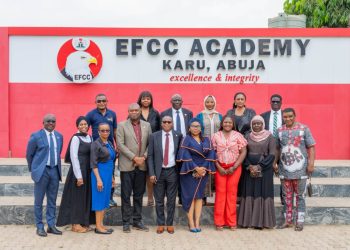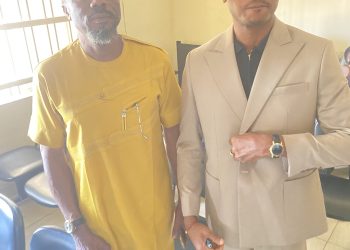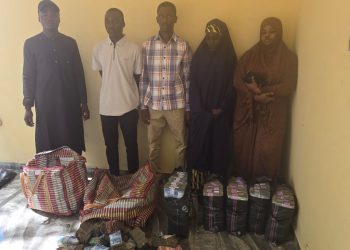By Nkechi Eze
The Executive Chairman of the Economic and Financial Crimes Commission (EFCC), Mr. Ola Olukoyede, has called on Nigerians to see the fight against insecurity and corruption as a collective national responsibility, stressing that sustainable peace and development can only be achieved through unified action and citizen participation.
In a statement made available to Newspeg by the EFCC spokesperson, Dele Oyewale, Olukoyede emphasized this position while addressing participants at a high-level national forum organised by the Voice of Nigeria (VON) on Tuesday, 3 June 2025, in Abuja. Represented at the event by Commander of the EFCC, CE Wilson Uwujaren, who is also the Director of the Public Affairs Department of the Commission, the EFCC boss underscored the urgent need for all Nigerians to be actively involved in safeguarding national security.
“This engagement today is an opportunity to harvest good ideas that will enhance our fight against insecurity and also promote good governance in our country,” Olukoyede stated. “It is gratifying that the organisers have identified collaboration and unity as useful ingredients for national development. I believe that there’s more that can be done when we put our hands together.”

He warned against the misconception that national security rests solely on the shoulders of military and intelligence institutions. “We cannot make real success in the fight against insecurity in this country if we leave that fight to our armed forces alone,” he asserted. “Every Nigerian has a role to play in ensuring that we enjoy peace across the length and breadth of our country. The fight against insecurity in our nation is not only for the police, not for the DSS or EFCC alone, all Nigerians have a role to play in this endeavour.”
Olukoyede went further to highlight the inseparable link between corruption and insecurity, noting that the mismanagement of public funds directly undermines national stability. “Many of us don’t actually understand the link between the fight against corruption and insecurity in our nation,” he explained. “If there’s no integrity in the use of resources, we can’t also make headway in the fight against insecurity. So, there’s a link between what we do at the EFCC and what the military is doing in prosecuting the fight against insecurity in our nation.”
He lauded VON for convening what he described as a timely and strategic dialogue, praising its inclusive approach and urging stakeholders to translate discussions into actionable policy and civic engagement. “The bottom line is that all of us have a role to play, and I congratulate VON for bringing us together to discuss this morning,” Olukoyede concluded.
The Minister of Information and National Orientation, Mohammed Idris, in his address at the event, reaffirmed the importance of the media in shaping national narratives. He urged journalists to report facts with responsibility and patriotism. “It is important for the media to say what is true and accurate,” the Minister said. “But it is also very important to know that they are doing that within the context of Nigeria. You must report responsibly, patriotically, and in the interest of our country at all times.”
Speaking on behalf of the National Security Adviser, Nuhu Ribadu, the Director of Legal Services at the NSA’s office, Zakari Mijinyawa, described the forum’s theme Citizen Engagement and National Unity, as both a “call for national action and a blueprint for national resilience.”
“National security is not the sole responsibility of our armed forces, or security personnel, or even government institutions,” he remarked. “It is a shared duty, a burden, and a blessing that we all have as citizens of the Federal Republic of Nigeria. A secured Nigeria is not merely built on guns and guards. It is built with trust, vigilance, and the daily commitment of the Nigerian people.”
The Chief of Defence Staff, General Christopher Musa, who served as the Special Guest of Honour, made a passionate appeal to citizens to deny terrorists the moral and logistical space they require to operate. “We should stop supporting them by denying them all the things they need to operate,” General Musa said. “What would be your gain if your country fails? So many people want us to fail as a nation and to disintegrate, but as God will have it, they’re seeing us thrive 10 years after their prediction of disintegration.”
Director-General of Voice of Nigeria, Mallam Jibrin Baba Ndace, noted in his welcome address that the event was more than a policy conversation, it was a launchpad for decisive, multi-sectoral action. “This forum is designed to create action,” Ndace declared. “It provides a strategic platform for inclusive dialogue and collaboration among key stakeholders, including the media, security agencies, policymakers, civil society actors, traditional and religious leaders, and youth representatives.”
Other notable contributions came from the Minister of Humanitarian Affairs, the Corps Marshal of the Federal Road Safety Corps, the President of the Nigerian Institute of Public Relations (NIPR), and the Etsu of Kwali. The traditional ruler urged parents, students, and educators to see themselves as the first line of national security through vigilance, ethical conduct, and civic responsibility.
The event closed with a collective call for strengthened synergy across government institutions, civil society, and communities to uphold national security and democratic values. Stakeholders left the forum with renewed commitment to fostering peace, integrity, and a unified national identity.














